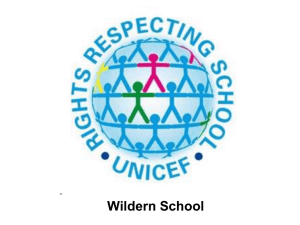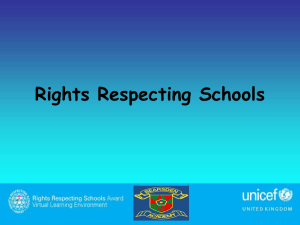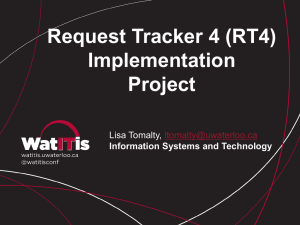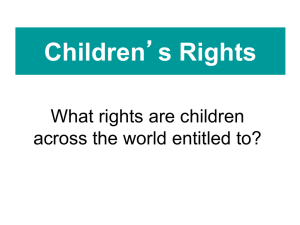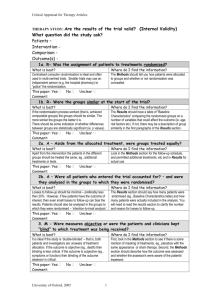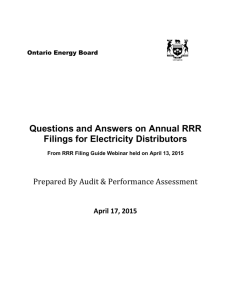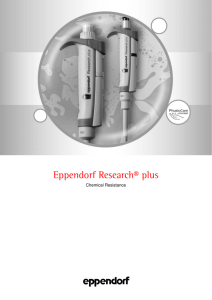John Hanson Community School 51kb
advertisement
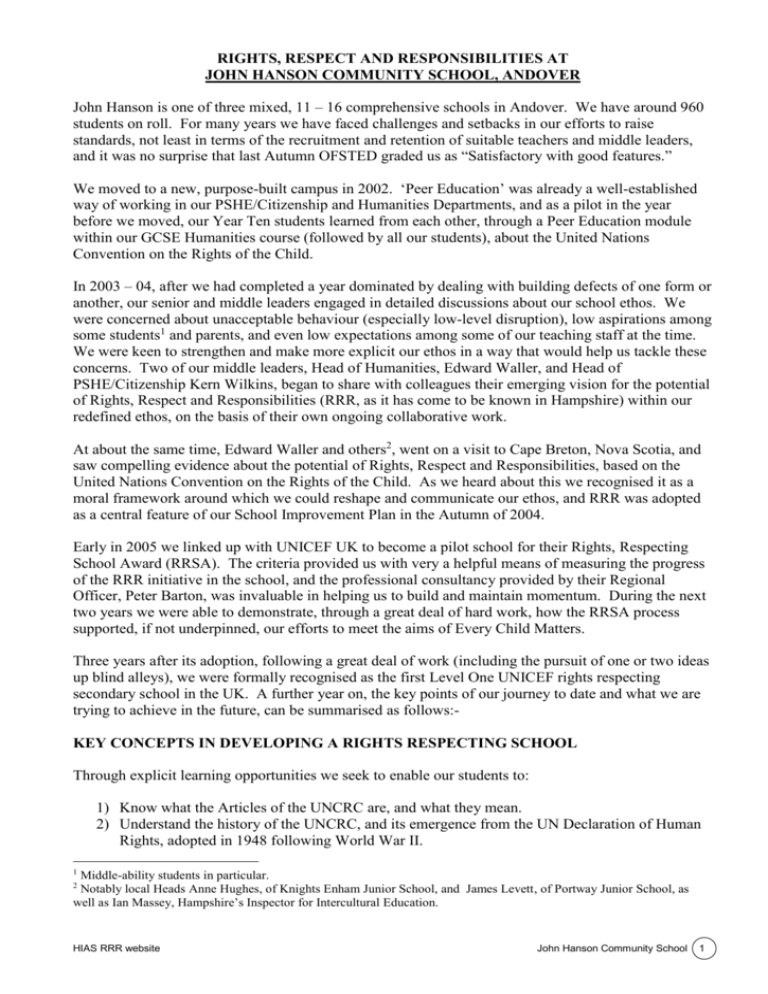
RIGHTS, RESPECT AND RESPONSIBILITIES AT JOHN HANSON COMMUNITY SCHOOL, ANDOVER John Hanson is one of three mixed, 11 – 16 comprehensive schools in Andover. We have around 960 students on roll. For many years we have faced challenges and setbacks in our efforts to raise standards, not least in terms of the recruitment and retention of suitable teachers and middle leaders, and it was no surprise that last Autumn OFSTED graded us as “Satisfactory with good features.” We moved to a new, purpose-built campus in 2002. ‘Peer Education’ was already a well-established way of working in our PSHE/Citizenship and Humanities Departments, and as a pilot in the year before we moved, our Year Ten students learned from each other, through a Peer Education module within our GCSE Humanities course (followed by all our students), about the United Nations Convention on the Rights of the Child. In 2003 – 04, after we had completed a year dominated by dealing with building defects of one form or another, our senior and middle leaders engaged in detailed discussions about our school ethos. We were concerned about unacceptable behaviour (especially low-level disruption), low aspirations among some students1 and parents, and even low expectations among some of our teaching staff at the time. We were keen to strengthen and make more explicit our ethos in a way that would help us tackle these concerns. Two of our middle leaders, Head of Humanities, Edward Waller, and Head of PSHE/Citizenship Kern Wilkins, began to share with colleagues their emerging vision for the potential of Rights, Respect and Responsibilities (RRR, as it has come to be known in Hampshire) within our redefined ethos, on the basis of their own ongoing collaborative work. At about the same time, Edward Waller and others2, went on a visit to Cape Breton, Nova Scotia, and saw compelling evidence about the potential of Rights, Respect and Responsibilities, based on the United Nations Convention on the Rights of the Child. As we heard about this we recognised it as a moral framework around which we could reshape and communicate our ethos, and RRR was adopted as a central feature of our School Improvement Plan in the Autumn of 2004. Early in 2005 we linked up with UNICEF UK to become a pilot school for their Rights, Respecting School Award (RRSA). The criteria provided us with very a helpful means of measuring the progress of the RRR initiative in the school, and the professional consultancy provided by their Regional Officer, Peter Barton, was invaluable in helping us to build and maintain momentum. During the next two years we were able to demonstrate, through a great deal of hard work, how the RRSA process supported, if not underpinned, our efforts to meet the aims of Every Child Matters. Three years after its adoption, following a great deal of work (including the pursuit of one or two ideas up blind alleys), we were formally recognised as the first Level One UNICEF rights respecting secondary school in the UK. A further year on, the key points of our journey to date and what we are trying to achieve in the future, can be summarised as follows:KEY CONCEPTS IN DEVELOPING A RIGHTS RESPECTING SCHOOL Through explicit learning opportunities we seek to enable our students to: 1) Know what the Articles of the UNCRC are, and what they mean. 2) Understand the history of the UNCRC, and its emergence from the UN Declaration of Human Rights, adopted in 1948 following World War II. 1 Middle-ability students in particular. Notably local Heads Anne Hughes, of Knights Enham Junior School, and James Levett, of Portway Junior School, as well as Ian Massey, Hampshire’s Inspector for Intercultural Education. 2 HIAS RRR website John Hanson Community School 1 3) Understand that rights are legally theirs from birth, for their lifetime. 4) Know that rights are a universal entitlement. 5) Recognise that having rights also means respecting the rights of others, and therefore accepting responsibilities towards others. 6) Know that the Rights of the Child, in summary, are about survival, development, protection and participation. 7) Understand that rights inevitably conflict sometimes, but that living by the UNCRC offers a means of resolving such conflict. 8) Appreciate that the UNCRC offers a global moral language for living. 9) Accept that rights issues are the same, whether at a local, regional, national or international level. 10) Be offered opportunities, in a supported environment, to feel what it might be like to have their rights abused or denied, and thus to empathise with others in this situation worldwide Through their exit questionnaire, the great majority of our Year Eleven leavers in 2008 acknowledged having learned some aspects of the UNCRC, and 39% of these cited specific ways in which this learning has helped them. This has been a feature of leavers’ questionnaires for the last three years, and while most examples cited are positive but predictable (“it made me want to help others”), a few are more thought-provoking; none more so than that of a girl in 2006, who wrote: “It has given me the confidence to stand up to my step-dad who I live with, and my Mum has as well.” RELATIONSHIPS RRR is at the heart of our ethos. Our claim that this is the case was tested and verified by OfSTED in November 2007, and by Andrew Bomford for the Radio Four PM programme the same month. Although we still have much to do, behaviour has improved significantly, and was graded ‘Good’ last Autumn, against the revised OfSTED criteria. Bullying has reduced significantly, to different extents in different year groups. In 2005 Hampshire’s Pupil Attitudes Survey, which is completed by several thousand students each year, showed that 35.6% of our then-Year Seven reported having been bullied in the previous year. This worrying figure compared with a County average of 25.1%. In 2007, only 7.4% of the same cohort of students reported having been bullied in the previous year, while the County average stood at 19.3%. Following their Inspection in November 2007, OFSTED concluded that students, “…have little fear of bullying, and have positive and tolerant attitudes towards each other.” 73% of Year Eleven leavers in 2008 reported positive changes in student behaviour following lessons on the UNCRC. They cited students respecting each others rights and opinions more, becoming more self aware / mature, treating each other more fairly, and they noted a significant reduction in bullying within the year group. Over the past three years there has been an encouraging increase in the percentage of Year Eleven students who feel that their rights are respected by their teachers. The school’s RRR-based values are shared with parents, and questionnaire responses demonstrate very positive support for what we are seeking to achieve. The improved relationships across the school, and the support for students experiencing relationship difficulties of one form or another, were central to our successful bid for Enhanced Healthy Schools Status. 2 John Hanson Community School HIAS RRR website STUDENT VOICE At the centre of RRR in our school is ‘The Rights Respecting Classroom’. When they were in Year Seven, students in our current Years Eight and Nine learned about the UNCRC, and then through roleplay and discussion, they developed their understanding of what a Rights Respecting Classroom looks like. This lesson was given lasting impact because it was taught by a group of Year Ten students, termed ‘Peer Educators’. These students received intensive training in the principles involved, and in the teaching approaches they might wish to draw upon as they plan their lessons. We no longer need to teach Year Seven students about ‘The Rights Respecting Classroom,’ because they now arrive from most of our feeder schools with a good understanding of the concept. However the model of engaging Year Ten Peer Educators to teach Year Seven students remains a powerful one, and this year their focus is on Global Citizenship (see below). Out of the Rights Respecting Classroom concept has emerged the Class Charter, negotiated between students and their teacher. All our staff are trained and encouraged to use a rights-respecting approach to all interactions with students, from promoting ‘Behaviour for Learning’ through to ‘Assessment for Learning’; this begins with the development of the Charter at the start of the year. Our Year Councils, and the whole-school Student Council, are centred on RRR, so much so that their constitution includes reference to their role in safeguarding relevant Articles of the UNCRC within the school. Their agendas and minutes reflect a level of maturity and debate which is far-removed from student-led campaigns to install vending machines! Their foci are Global Citizenship and Sustainability, although they and other students play a key role in the selection of new teaching staff and other activities which shape the school’s direction. After some initial reservations3, the great majority of out teaching and support staff have embraced RRR, and recognise that the positive relationships it helps them to establish, lead to students being more active partners in the learning process. GLOBAL CITIZENSHIP Learning about global citizenship and global inequality, long established in PSHE/Citizenship and Humanities, and reinforced in several subject areas with different year groups, is further extended this year in two ways. First, as our students now learn about the UNCRC before reaching us, the model of engaging Year Ten Peer Educators has evolved into them leading Year Seven lessons on the UN’s Millennium Development Goals. Second, our provision has been enriched this year because of a link with a Year Ten Statistics class. This class has carried out research and conducted a statistical analysis of development indicators such as Gross National Product and the Human Development Index. The findings have then been discussed in terms of RRR. Next year these Statistics students will educate their peers in Humanities lessons about the nature of poverty and how it can be recognised. This will be followed by further student input as the RRR Peer Education Team offer their work on the causes, consequences and potential solutions to global inequalities. Taking their lead from an existing link between the PSHE/Citizenship Department and Abonse, a village in Ghana, four of our Year Eleven students, on their own initiative, travelled to Abonse last October. They had previously raised the money for the trip, including the cost of providing staff to accompany them. They gained first-hand awareness of another community, in which physical poverty and inequality, relative to their own experience, contrasted with a strong sense of mutual respect and community responsibility that does not exist as overtly or as effectively in the UK. They returned to They were having to deal with challenging students who ‘know their rights’ from time to time, when in reality the only rights they really knew were those relating to ‘stop and search!’ 3 HIAS RRR website John Hanson Community School 3 school having established an RRR link with a Ghanaian secondary school, and committed to sharing what they had seen with their peers and with students in their feeder schools, in order to ensure that our link with Ghana is a long-term one. Their experiences form the basis of a Citizenship unit that personalises many of the global citizenship issues explored in Humanities. NEXT STEPS RRR is not a quick, off-the-shelf fix. There is no manual, no blue-print for how to embed it within a school, although working back from the UNICEF Rights Respecting School criteria is a valuable activity. Nevertheless it offers a moral framework for the purpose of school leadership, one which has universal recognition, and which provides common touchstones regardless of personal faith. It has to be acknowledged that RRR development is much more difficult to steer, control and sustain in a secondary setting, with large numbers of different teachers working with each child, than it is in a primary school, where a great deal can be achieved in a single classroom. This being said, for us it has already led to a cultural shift, although there is plenty more to be done to embed and develop it: Consolidating the RRR vision within the school, and becoming more successful at encouraging vulnerable or hard to reach students to ‘buy in’ to the school’s value system - essential to improving educational outcomes . In this regard, indeed more generally, RRR has a significant part to play in promoting social cohesion. The key to success lies, almost certainly, in finding additional opportunities for student participation in the life and direction of the school. Extending the role of the Student Council to include a role in monitoring behaviour in lessons. If this is successful, they will help us to evaluate behaviour on a regular basis against OfSTED’s criteria. Piloting SEAL from September 2008, in order to ensure that all students have the skills4 required to engage successfully with the concepts involved in RRR – or put another way, “to walk the talk.” Creating more curriculum and cross – curricular opportunities for revisiting RRR through subject areas, and for promoting critical thinking using RRR. Building on our early efforts to use RRR and the UNCRC as a basis for developing students’ understanding of global citizenship, and willingness to see themselves in a global context. Arguably, we are part of the first 5 – 16 family of schools in the UK5 to have a shared, universally understood, non faith-based moral framework – we are passionate about building on this, and exploring its potential for improving transition, continuity and progression. Making a leading contribution to our shared aspiration for every school in the Northern Test Valley Partnership for Education to adopt RRR, and involving community leaders and external agencies in developing our locality as a ‘Rights Respecting Community.’ Sharing RRR with other schools and agencies inside and beyond Hampshire; we have already hosted several visits from within Hampshire and nearby counties, even two from New Zealand. Last Autumn we were represented at a fact-finding meeting in a local Junior School with the Rt. Hon. Beverley Hughes MP, Minister of State for Children, Young People and Families Steve Evatt, Headteacher, June 2008. 4 The five skill areas developed through SEAL (Social and Emotional Aspects of Learning) are self-awareness, managing feelings, empathy, motivation and social skills. 5 Balksbury Infants’ School and Balksbury Junior School. 4 John Hanson Community School HIAS RRR website
